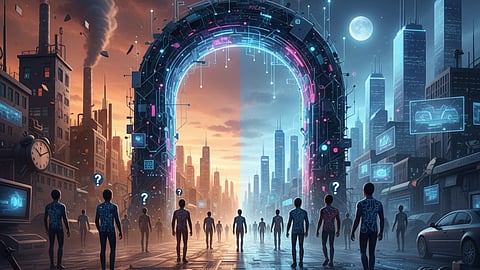Leaders in the AI era
Artificial Intelligence is no longer something we imagine in the future – it’s here, gradually shaping our lives. It determines the content we see online, has the ability to influence markets, influence how companies make decisions, and can even predict what we might want, before we know it ourselves. The future will not belong to those who merely understand technology, but to those who can steer it responsibly.
Over time, as these technologies get better at thinking, we will have to reflect on what it truly means to be human. Perhaps, the answer is not thinking faster but feeling deeper. It is high time we understand that humans must get better at feeling because the future won’t just belong to those who understand technology but to those who can guide it responsibly, with ethics as their compass and empathy as their guide.
A new kind of leadership: Earlier leadership was about strategic thinking and a clear vision, but now, it is about something deeper that is beyond logical thinking, which is to have the moral courage to do what’s right today. In the world driven by algorithms, a single decision can ripple across entire societies – sometimes in ways leaders may never predict.
Technology is not neutral. Every line of code reflects human choices, priorities, and biases. When an AI hiring tool favours one gender, or a predictive policing system unfairly targets certain groups, it’s not just a bug but a mirror showing us who we are. Ethical leadership in this era begins with awareness. It means choosing to say ‘no’ to short-term wins when they come at the long-term costs, because growth without reflection is nothing but a hollow victory. The leaders of tomorrow will be the ones who ask not just ‘Can we build it?’ but ‘Should we?’
The power of empathy: In the era when the world is obsessed with data, this might seem outdated, but it’s empathy that reminds us of the human story behind every dataset. Leaders with empathy don’t just manage information but also care about their aftereffect. At a time when AI can analyse emotions but not really experience them, leaders will need to develop their moral imagination, the power to anticipate not only what technology can do but how it can benefit humanity. Effective leadership also requires emotional intelligence – the power to listen, to stop and to envision the impact of one’s decisions beyond spreadsheets and dashboards.
They see how technology would affect not just users and employees, but entire communities. Today, the challenge is not only to prepare students for a digital future but to guide them to shape it wisely.
These two qualities – empathy and ethics – make us human and should become central pillars of our education system. It cannot be an addition that is optional, but essential dimensions of leadership in the age of AI. It is no longer sufficient for learners to master technology; they must also understand its human implications. The leaders of tomorrow will need both intellectual rigour and moral depth. They would have the ability to interpret data and also to discern right from wrong in its application.
As we embark on this new age, the dialogue between humans and machines needs to be driven by conscience. The development of AI needs to reflect the development of our humanity, not only in intelligence but in integrity. As mostly talked about, our concern should not be whether AI will replace people or not, but we need to focus on whether we can aspire to lead with more purpose, empathy and wisdom.
Universities today should create an environment where critical inquiry meets compassion – where the study of algorithms coexists, balancing their social, cultural and ethical consequences. An education system that is not confined to disciplines but enriched by dialogue between them, where engineering would meet ethics, design would meet philosophy, and innovation would meet empathy.
When education is grounded in both knowledge and conscience, it produces more than just capable professionals. It shapes thoughtful citizens and responsible leaders. These are the individuals who will not only build systems that are intelligent, but also societies that are just and humane. The purpose of higher education, then, must evolve. It is not only to equip students with skills for success, but to awaken in them a sense of stewardship – a recognition that every technological advancement carries a moral responsibility. In nurturing this awareness, we ensure that progress remains aligned with humanity’s deepest values.

